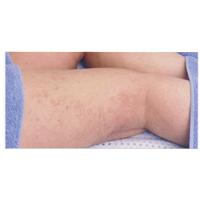
London: Dr Angus Gordon, Medical Director of the Katherine Corbett Clinics, discusses treatments for unsightly thread veins, which can arise during pregnancy.
Becoming and being pregnant is a life changing experience. The nine months that follow, are supposed to be filled with anticipation and excitement – then reality sets in.
No one properly explains to you the morning sickness, the cramps, the mood swings, and the vast and complex array of changes your body goes through. Coupled with all of this, is the frustration of trying to feel attractive, while coming to terms with how you are no longer able to slide into your favourite pair of jeans.
Then there is the unsightly condition of thread veins, something which is becoming more common in young women during pregnancy. Thread veins are small red or purple capillaries close to the surface of the skin which are harmless but women do find them unpleasant. Thread veins tend to be hereditary and expectant women can develop them due to high levels of oestrogen. Another cause may be due to obesity — a growing problem in the UK and western societies in general. Thread veins are extremely common and often affect the face and legs, but can be found on other parts of the body too.
The removal of thread veins is classed as a cosmetic treatment, and because of this it is not a procedure available through the UK’s government health service, the NHS. Many expectant mothers develop them during their pregnancy, and become anxious as they believe there is no proper treatment for the condition. However, one of Londons leading and longest established aesthetic clinics, specialising in surgically non-invasive treatments, the Katherine Corbett Clinics (KCC), has been providing safe and effective treatments for over 50 years.
KCCs Medical Director, Dr Angus Gordon says: I fully understand the anxiety and psychological impact thread veins can cause. Thread veins affects women of all ages in some cases they can be as young as 18, so I think they can be reassured that treatment is available that will reduce and improve the unsightly appearance of the veins.
Dr Gordon explains: Our clinic specialise in such treatments for women who have recently given birth. Our sclerotherapy treatment programmes have proved to be more effective than laser alternatives, which can have unpleasant side effects. Initially, a patient may require two or three sessions spread over a few months and after that an annual check up. However, as all patients are different in some instances a patient can go up to five years before they need further treatment.
The Katherine Corbett Clinic in the centre of the West End at South Molton Streetis home to a dedicated team of experienced and professionally qualified nurses, who work closely with Dr Gordon, and are committed to ensuring that patient safety always comes first. A free consultation will always result in a realistic assessment of whether sclerotherapy will provide the results a particular patient is hoping for.
It is an important philosophy of our approach to ensure that patients are not given false expectations about the outcomes for the treatment, or indeed, whether it is appropriate. Sometimes it is not and we will advise the patient, but in where we believe sclerotherapy will help and it is used patients are delighted with the results, concluded Dr Gordon.
More information and advice about thread veins is available on the KCCs website at www.kcclinics.co.uk
